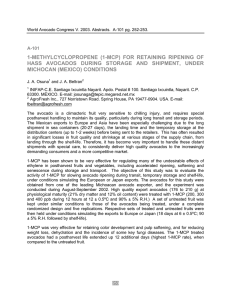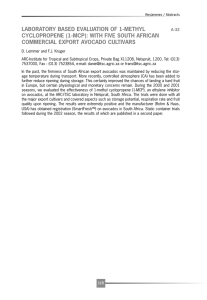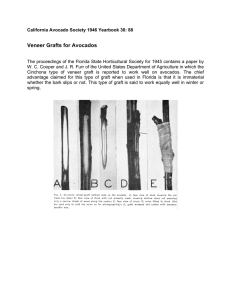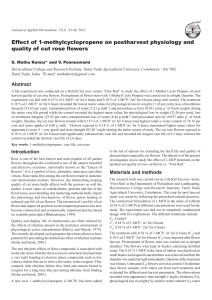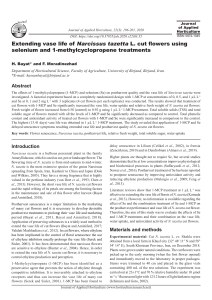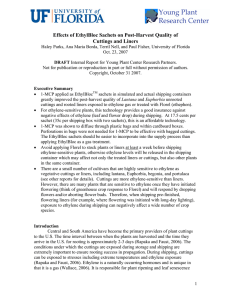1-METHYLCYCLOPROPENE (1-MCP) FOR MAINTAINING QUALITY OF
advertisement
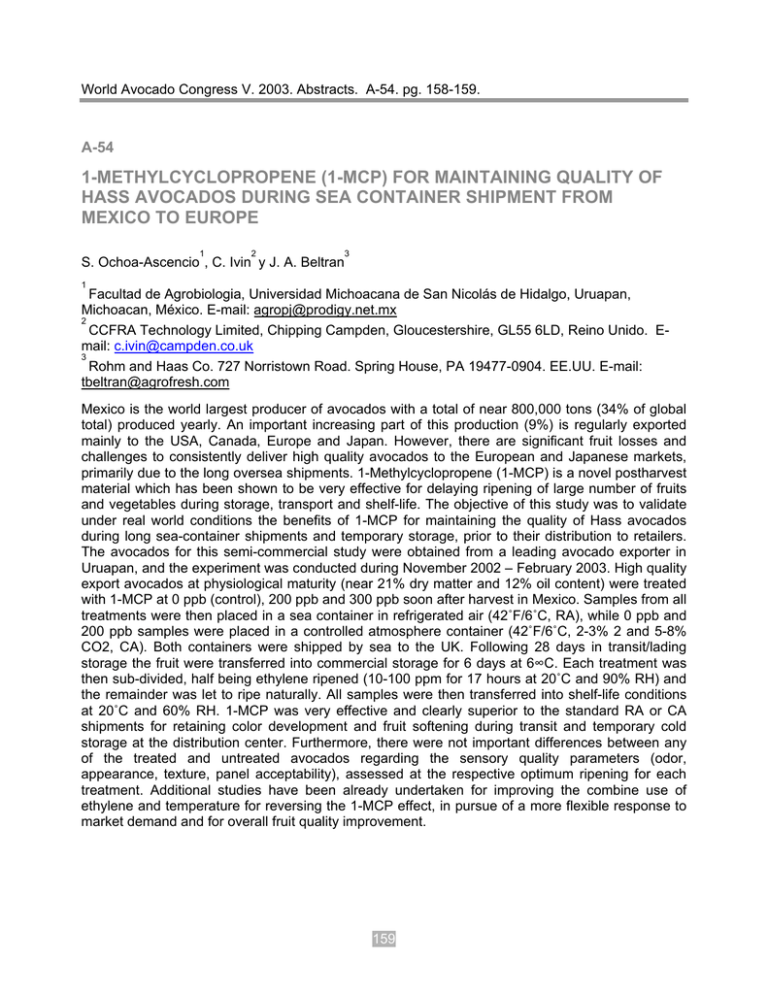
World Avocado Congress V. 2003. Abstracts. A-54. pg. 158-159. A-54 1-METHYLCYCLOPROPENE (1-MCP) FOR MAINTAINING QUALITY OF HASS AVOCADOS DURING SEA CONTAINER SHIPMENT FROM MEXICO TO EUROPE 1 2 S. Ochoa-Ascencio , C. Ivin y J. A. Beltran 3 1 Facultad de Agrobiologia, Universidad Michoacana de San Nicolás de Hidalgo, Uruapan, Michoacan, México. E-mail: agropj@prodigy.net.mx 2 CCFRA Technology Limited, Chipping Campden, Gloucestershire, GL55 6LD, Reino Unido. Email: c.ivin@campden.co.uk 3 Rohm and Haas Co. 727 Norristown Road. Spring House, PA 19477-0904. EE.UU. E-mail: tbeltran@agrofresh.com Mexico is the world largest producer of avocados with a total of near 800,000 tons (34% of global total) produced yearly. An important increasing part of this production (9%) is regularly exported mainly to the USA, Canada, Europe and Japan. However, there are significant fruit losses and challenges to consistently deliver high quality avocados to the European and Japanese markets, primarily due to the long oversea shipments. 1-Methylcyclopropene (1-MCP) is a novel postharvest material which has been shown to be very effective for delaying ripening of large number of fruits and vegetables during storage, transport and shelf-life. The objective of this study was to validate under real world conditions the benefits of 1-MCP for maintaining the quality of Hass avocados during long sea-container shipments and temporary storage, prior to their distribution to retailers. The avocados for this semi-commercial study were obtained from a leading avocado exporter in Uruapan, and the experiment was conducted during November 2002 – February 2003. High quality export avocados at physiological maturity (near 21% dry matter and 12% oil content) were treated with 1-MCP at 0 ppb (control), 200 ppb and 300 ppb soon after harvest in Mexico. Samples from all treatments were then placed in a sea container in refrigerated air (42˚F/6˚C, RA), while 0 ppb and 200 ppb samples were placed in a controlled atmosphere container (42˚F/6˚C, 2-3% 2 and 5-8% CO2, CA). Both containers were shipped by sea to the UK. Following 28 days in transit/lading storage the fruit were transferred into commercial storage for 6 days at 6∞C. Each treatment was then sub-divided, half being ethylene ripened (10-100 ppm for 17 hours at 20˚C and 90% RH) and the remainder was let to ripe naturally. All samples were then transferred into shelf-life conditions at 20˚C and 60% RH. 1-MCP was very effective and clearly superior to the standard RA or CA shipments for retaining color development and fruit softening during transit and temporary cold storage at the distribution center. Furthermore, there were not important differences between any of the treated and untreated avocados regarding the sensory quality parameters (odor, appearance, texture, panel acceptability), assessed at the respective optimum ripening for each treatment. Additional studies have been already undertaken for improving the combine use of ethylene and temperature for reversing the 1-MCP effect, in pursue of a more flexible response to market demand and for overall fruit quality improvement. 159
